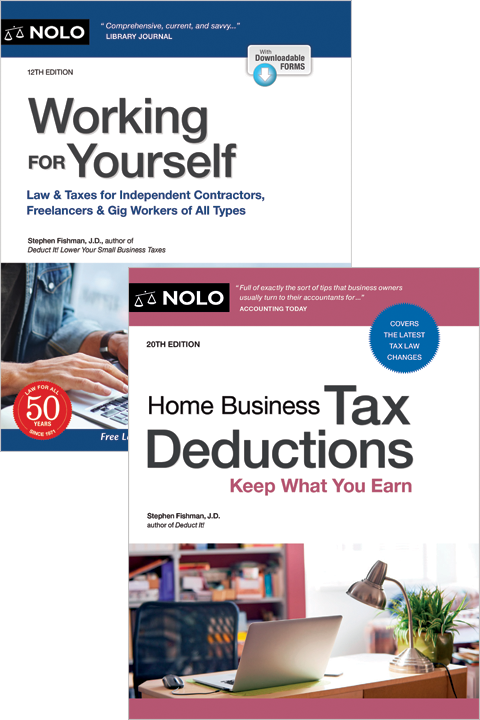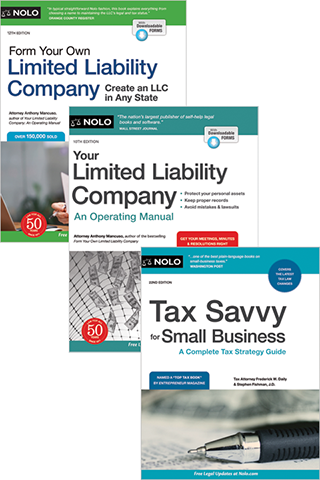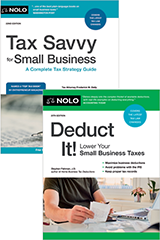Nolo's Home Business Bundle
- Bundle Products
- Home Business FAQs
- You are your own boss.
- You may be paid more than employees.
- No federal or state tax is withheld from your pay.
- You can deduct many business expenses.
- No job security.
- You might not get paid.
- You must pay self-employment taxes.
- You may be personally liable for business debts.
- No employer-provided benefits such as health care or paid vacation.
- No unemployment insurance benefits.
- No employer-provided workers’ compensation.
- Few labor law protections.
- Each party’s rights and obligations, in detail. Don't leave anything out; if you discuss something and shake on it but it's not in the contract, it will be next to impossible to enforce. If you forget to include something, you can always create a short written amendment. Or, if you haven't signed the agreement, just handwrite the change and have everyone initial it.
- Payment obligations. Specify who pays whom, when the payments must be made, and the conditions for making payments. If payment will be made in installment or only when work is completed to the customer’s satisfaction, list dates, times, and requirements.
- Circumstances that terminate the contract. Set out the circumstances under which the parties can end the contract—for example, if one party misses too many important deadlines.
- A way to resolve disputes. State what you and the other party will do if something goes wrong—mediation, arbitration, or court. And if you and the other party are in different states, choose which state’s law will govern any disputes and where you must mediate or sue.
- Write demand letters. Send past due notices promptly once an account is overdue. Save copies of all correspondence.
- Call. Keep your calls short and be specific. Stay calm but always maintain a sense of urgency about getting paid. Don't leave more than one phone message a day or leave messages that threaten or contain statements that put the person in a bad light. Keep notes of all conversations.
- Negotiate. If the customer has genuine financial problems, work out a realistic schedule for payment and get it in writing. If an account is fairly large and has been unpaid for months, consider offering in writing a time-limited, deep discount to resolve the matter.
- Use a collection agency to send letters. For a fixed fee, (around $30) a collection agency will write letters or make calls for you. This is different than turning over the debt to an agency.
- Turn the account over to a collection agency. This is your last resort. A collection agency will usually pay you 50% of what it recovers.
- You meet patients, clients, or customers at home.
- You use a separate structure on your property exclusively for business purposes.
What is an independent contractor?
An independent contractor (IC) is someone who runs his or her own business. Independent contractors are sometimes called consultants, freelancers, or self-employed. Unlike an employee who works for one employer, independent contractors typically work for a number of different clients.
Should I become an independent contractor?
Being an independent contractor suits some people very well, and others not at all. There can be many advantages to being self-employed:
Of course, there are drawbacks, too, including:
What do I need to know about contracts?
As an independent contractor, you’ll want to get agreements with customers in writing so that everyone’s expectations are clear. Contrary to what many lawyers think, you don't need a lot of legal jargon to make a contract enforceable. Instead, use short, clear sentences with simple, numbered paragraph headings. Be sure to include:
How do I pay income taxes?
If you're an independent contractor, you won't have any tax withheld from your pay. But of course, you still have to pay taxes. And you can’t wait until April 15 to pay all of your taxes for the previous year. You must pay tax on your estimated annual income in quarterly payments. These estimated taxes cover income tax and self-employment taxes (Social Security and Medicare taxes).
How long should I keep tax and other business records?
Business income tax returns. Keep a copy of your business income tax returns and related correspondence with the IRS permanently to help you prepare future or amended returns. The IRS recommends that you keep supportive records that corroborate any business income or deductions claim until the “period of limitations” expires for that tax return—typically, six years. So a good rule of thumb is to hang on to all tax records for seven years.
Business asset records. If business property is involved, the IRS recommends keeping your records until the period of limitations ends from the year you disposed of that property. These records will aid you in calculating applicable depreciation, amortization or depletion deductions and to determine any gain or loss on that property. If the business property is real estate or a vehicle, keep the deed or vehicle title in a safe, secure spot until you sell or otherwise properly dispose of that property.
Business ledgers and other key documents. CPAs often recommend that businesses keep their journal entries, profit and loss statements, financial statements, check registers and general business ledgers permanently. Similarly, major business documents, like annual reports, corporate by-laws and amendments, Board of Director information, annual meeting minutes and business formation documents, should be kept permanently. Aside from supportive tax records, other documents such as accounts payable/receivable ledgers, invoices, and expense reports should be kept at least seven years.
Cancelled checks. Cancelled checks without a tax or other significant business purpose can normally be destroyed after about seven years. If a cancelled check is a supporting tax document, then follow the IRS rules discussed above.
Bank account and credit card statements. Generally, you should keep these records about seven years, or longer if they are supporting documents for tax purposes. If they have no tax or other key business purpose, then consider retaining your business’s detailed annual statements for seven years and tossing the monthly statements after about a year.
Do I need business insurance?
It’s a good idea to purchase enough insurance to cover your company's assets. Even if you form a corporation or LLC, which shield your personal assets from business liabilities, you still risk losing your business if disaster strikes. Insurance can greatly reduce this risk. The two most common types of business insurance policies are property insurance and liability insurance.
If you have a home-based business, you may need to adjust your homeowner's policy. Check to see whether your homeowner's insurance is limited (or even voided) if you run a business from home. If so, upgrade your policy to include business use of the home and business-related claims.
Liability coverage protects your business if someone is injured on your premises and sues you. A general liability policy (versus a product liability or vehicle liability policy) covers damages that your business is ordered to pay to an individual (customer, supplier, business associate) who is injured on your property.
What can I do if a customer doesn’t pay me?
When you’re an independent contractor, you don’t get a regular paycheck—you rely on customers to pay you. Some may need a little nudge. Here are steps you can take.
If I claim a deduction for a home office, will the IRS audit me?
It’s perfectly legal to deduct expenses for what the IRS calls the “business use of your home,” and claiming this deduction is not automatically a red flag at the IRS. If you meet the requirements of the tax law, you should be able to deduct a percentage of expenses such as utilities, rent, insurance, depreciation, mortgage interest, real estate taxes, and some casualty losses, repairs, and improvements (if they relate to the part of the house you use for business).
The home office deduction is available to renters and homeowners alike. It is available for office space and other areas you use for business in your home, such as a studio, workshop, or garage. And according to the IRS, a home can be a house, condo, or apartment -- even a mobile home or boat, as long as you can cook and sleep there.
You must meet two requirements to qualify for the home office deduction:
Regular and exclusive use. You must regularly use part of your home exclusively for a trade or business.
Principal place of business. You must be able to show that you use your home as your principal place of business. Alternatively, you must be able to show at least one of the following:




